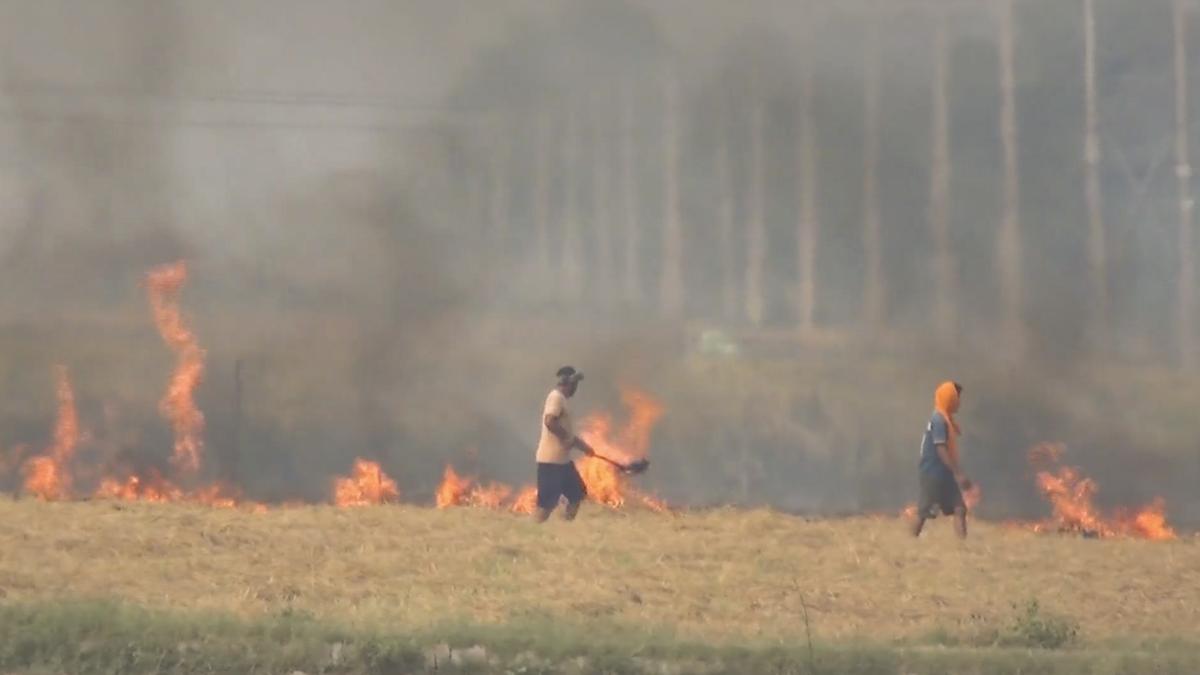Stubble Burning and the Supreme Court's Ruling: Protecting the Right to a Pollution-Free Environment

- 24 Oct 2024
Introduction
Recently, the Supreme Court of India expressed serious concerns about the ongoing issue of stubble burning in the states of Punjab and Haryana. The Court criticized the selective enforcement of penalties for stubble burning and emphasized that such practices violate citizens' fundamental right under Article 21 of the Indian Constitution, which guarantees the right to live in a pollution-free environment.
Court’s Observations on Stubble Burning
- The Supreme Court highlighted the failure of state governments in effectively implementing laws against stubble burning.
- Selective Enforcement: The Punjab and Haryana governments were accused of prosecuting only a few violators while allowing many others to escape punishment by paying a nominal fine.
- The Court observed that this approach is a blatant violation of the right to live in a pollution-free environment, which is guaranteed under Article 21 of the Constitution.
Right to a Pollution-Free Environment
- The Court emphasized that every citizen has the fundamental right to live in an environment free from pollution, as mandated by Article 21 of the Constitution.
- The Court questioned the effectiveness of current environmental regulations, specifically pointing out the lack of proper machinery to collect fines under Section 15 of the Environment (Protection) Act, 1986.
Impact of Stubble Burning
Stubble burning, primarily in the northern states of India, exacerbates air pollution, especially in Delhi and surrounding regions. The seasonal spike in air pollution during the months of October and November is largely attributed to farm fires. This not only worsens the air quality but also has severe implications for public health.
Environmental and Health Consequences
- Air Pollution: The burning of crop residues significantly contributes to the rise in PM2.5 and PM10 levels, leading to hazardous air quality.
- Soil Health: Burning crop residues depletes essential nutrients from the soil, reducing organic carbon content and harming soil fertility.
Health Risks
- Exposure to pollutants like particulate matter (PM) can lead to respiratory problems, heart diseases, and other health complications for the population, especially in densely populated areas like Delhi.
Legal and Institutional Shortcomings
- Inadequate Implementation: Despite laws and penalties being in place, the lack of an effective enforcement mechanism has resulted in the persistence of stubble burning.
- Toothless Penalties: The Supreme Court criticized the amended Section 15 of the Environment Protection Act, 1986, which replaced criminal penalties with financial fines for environmental violations. However, the lack of rules and appointed adjudicating officers has rendered this provision ineffective.
- No Serious Enforcement: The failure of the Central government and state authorities to implement effective penalties has led to widespread non-compliance with environmental laws.
Government Actions and Responses
Centre’s Efforts:
- The Central Government has introduced a Central Sector Scheme to promote agricultural mechanization for in-situ management of crop residue in Punjab, Haryana, Uttar Pradesh, and Delhi.
- The government provides financial assistance of up to 50% for the purchase of machinery, such as the Happy Seeder, to manage paddy stubble without burning.
- A total of ?3,062 crore has been released from 2018 to 2023 to tackle stubble burning.
State-Level Actions:
- The Punjab government has introduced cash incentives for farmers who refrain from burning stubble. Additionally, the state is offering non-fiscal incentives, such as access to panchayat land for storing paddy straw.
- The Pusa Decomposer, developed by the Indian Agricultural Research Institute (IARI), is a bio-enzyme used to decompose crop residue. It helps in turning the stubble into manure within 20-25 days, enhancing soil health.
Challenges for Farmers:
- Many farmers still prefer burning stubble due to high costs associated with alternative methods of residue management.
- The Happy Seeder and other machinery remain expensive and are not affordable for most small-scale farmers, leading them to resort to burning as the most cost-effective option.
Court’s Directive and the Way Forward
- The Supreme Court directed the Centre and state governments to ensure better enforcement of laws related to air pollution, vehicular emissions, and industrial pollution.
- The Court also urged the Union Government to consider Punjab’s request for additional funds to tackle the stubble burning issue and to strengthen the enforcement mechanism.
- Urgency for Action: The Court’s observations suggest that the existing framework needs urgent reforms to protect citizens’ right to a pollution-free environment.
Constitutional Provisions Related to Environmental Protection
India’s Constitution provides several provisions to ensure the protection of the environment:
Article 21: Right to Life and Environment
- In the landmark case Subhash Kumar v. State of Bihar (1991), the Supreme Court held that the right to life under Article 21 includes the right to a wholesome environment.
- This view was reiterated in Virender Gaur v. State of Haryana (1994), further strengthening the legal framework for environmental protection.
Directive Principles of State Policy
- Article 48A: The State is mandated to protect and improve the environment and safeguard forests and wildlife.
- Article 39(e) and 47: These Articles place a duty on the State to promote public health and ensure environmental protection.
Fundamental Duties
- Article 51A(g) places a duty on citizens to preserve and protect the environment.
Conclusion
The Supreme Court’s ruling highlights the urgent need for better implementation of environmental laws and the protection of citizens’ fundamental rights under Article 21. While government schemes are in place, a more robust and consistent approach is required to address the issue of stubble burning and air pollution. Immediate reforms in the enforcement mechanisms and incentives for farmers are crucial to achieve a sustainable, pollution-free environment in India.
